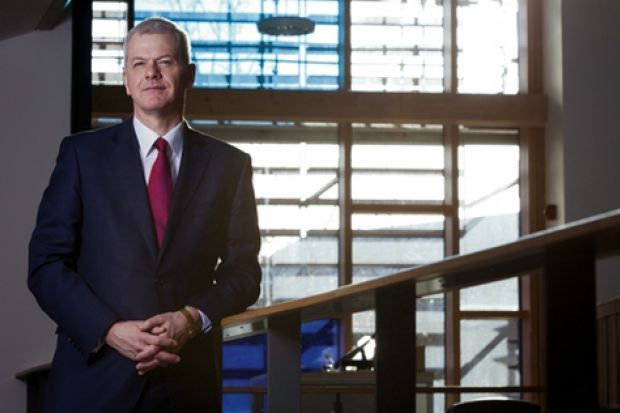"I'm not here as a technocrat," insisted former government education chief Sir David Bell, leaning back on the sofa in the vice-chancellor's office at the University of Reading.
Keen to show that he is no Sir Humphrey Appleby, the obstructive civil servant in the BBC sitcom Yes Minister, he stressed that he would bring more than just a sound managerial mind to his first role in higher education.
"I am an educationalist," Sir David said. "I have seen the value of what education can do. In my own case, I was the first person in my family to go to university. I'm coming here as someone who is passionate about what education represents."
Being an outsider to academia is something he is not overly concerned about, either; after all, education has been a long-term commitment.
Although best known for his roles within Whitehall, he started his working life as a teacher, having graduated from the University of Glasgow. He was a head teacher by the age of 30 before becoming assistant head of education at Newcastle City Council in 1990 and director of education and libraries in 1995.
He went on to serve as chief executive of Bedfordshire County Council for two years before he was made chief inspector of schools in England in 2002.
Sir David became permanent secretary at the Department for Education and Skills in 2006, and accepted the vice-chancellor's job at Reading last October.
"I have been an outsider in my past three jobs - I didn't come through the traditional routes for university, the Civil Service or local government," he explained.
"At the end of those jobs, no one said: 'That Bell bloke never got it' or 'He was never sympathetic to what we were doing'. I have brought some of the virtues of being an outsider, but I embedded myself in those institutions. I won't be a gimlet-eyed technocrat who has no feel for the core purpose of a university."
He was also keen to put the record straight on the news coverage of his departure from government.
"Absolute nonsense" was his view of the stories splashed on the front page of The Sunday Times, which reported a "mass clearout" of Labour-appointed mandarins by Michael Gove, the Conservative education secretary.
Claims that civil servants in his department were deliberately slowing the breakneck speed of Mr Gove's reforms through "passive resistance" were also false, he said.
"It was just an unfortunate coincidence that a lot of [top civil servants] left at the same time," he said. "I could not say that every single civil servant was behind the government's policies, but the expectation on us was clear: we were there to serve the elected government."
It was also alleged that Sir David had been "frozen out of discussions" within the department, but he said that he was "actually round the table all the time".
"The truth is often more prosaic than the news [headlines]. I had said to Michael Gove just after the election that I did not intend to go through to the end of the Parliament as I had already done four and a half years in the post."
Although "quite keen" to stay on in the first years of the government, since Mr Gove "was the first coalition education secretary since Rab Butler", Sir David got a more attractive offer.
"I had been approached by various institutions, but Reading - a traditional research-led institution - was one of the few jobs that would match a promotion," he said.
Solid foundations
Sir David said that his mission at Reading was "to maintain, enhance and reinforce our position as a leading research-intensive institution".
With the university's fees for next autumn set at £9,000 a year, he said that providing "an intellectually challenging and demanding experience" was the best recipe for success.
He has solid foundations to build on, with last week's application figures showing a healthy 10.5 per cent increase for Reading against an average decline across all institutions in England of 8.5 per cent.
Sir David also highlighted investment on campus after the university signed a £230 million deal with the University Partnerships Programme in December to transfer all its student accommodation to the firm - the biggest such deal in the UK to date.
Despite objections from student unions over public-private partnerships of this stripe, he said it was right to embrace a "mixed economy" within higher education.
"Five years ago, accommodation was a real pinch point for the university," he said. "Doing nothing was not an option."
The university's new Malaysia campus - specialising in law, business, pharmacy, chemistry and finance, and expected to open in 2014 - will also be funded by private capital. Sir David said that about 2,000 students would be studying there by 2017.
"A university like this should have a presence elsewhere in the world," he added. "It shows you are a serious international player."
Register to continue
Why register?
- Registration is free and only takes a moment
- Once registered, you can read 3 articles a month
- Sign up for our newsletter
Subscribe
Or subscribe for unlimited access to:
- Unlimited access to news, views, insights & reviews
- Digital editions
- Digital access to THE’s university and college rankings analysis
Already registered or a current subscriber? Login
